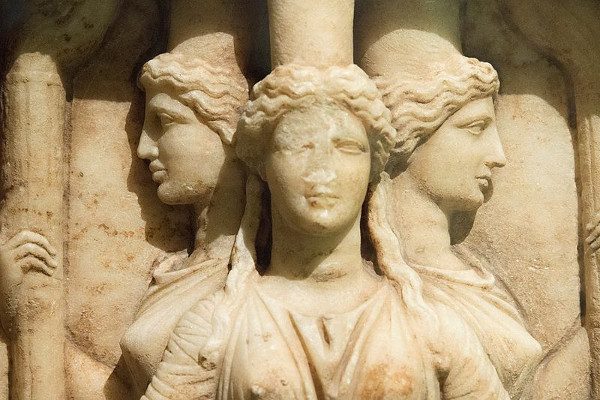
Hekate is a goddess of the marginalized. Witchcraft is a tool of the disenfranchised. I’m not the first to blog about this, have blogged on similar topics in the past, and others have made some excellent points that I will try not to repeat too much.
As a popular goddess it’s easy to see an oversaturation of content in regards to Hekate with both good and dubious takes on her. Because she is so beloved to so many people, there have been many takes on her based on both historical data and a good chunk of misinformation. So while I’m not unsympathetic to those who are skeptical of bad information on popular deities, I also have been heavily involved in academic and reconstructionist-style Hellenism for a long time and am pretty familiar with all sides and how there are those who want to cherry pick historical data or even revise it out of discomfort in what is presented in it. Hekate is a popular example as a topic and deity who is terribly misunderstood, misrepresented, and often just flat out ignored because her popularity is seen as a bug and not a feature.
But her popularity is for excellent reasons, and not just because she’s a goddess of witchcraft. However it remains a very well known element of hers, one that is frequently downplayed in certain Hellenic reconstructionist communities, often at the cost of truly understanding Hekate and her worship. However, anyone remotely familiar with the PGM (Greek Magical Papyri) is already extremely familiar with how Hekate was commonly invoked and prayed to in acts of magic in antiquity. Arguing that she “wasn’t really a goddess of magic” and that this is merely a modern association is just flat out wrong and very easily disproved. But as I’ve stated before, she isn’t a goddess of just magic, or just any one thing. She’s a goddess of many functions and many epithets.
“Soteira” (Σώτειρα) is the female version of the Greek word Soter (σωτήρ) meaning “savior”. It’s an epithet given to a number of Greek gods, and happens to be one of Hekate’s as well. She is one of a few goddesses who also bears this epithet: Artemis and Persephone also being notable examples. Her deipnon or monthly supper offerings during new moons in historical times weren’t just a means of giving her offerings but also a subtle/not subtle way to provide food for the homeless and hungry. It was a known fact that people who were in need would eat the offerings. They weren’t just offerings to the goddess but also a means of providing her an offering by helping others. While a few frowned upon this, it became quite acceptable to do so.
Hekate has long been a goddess of the marginalized, and while this has been and continues to be met with resistance, it makes a lot of sense given how she is a goddess who crosses over boundaries and rules liminal places. This is not a goddess who would spurn those in need because they ate her offerings, and many people believed that the poor eating them pleased her. “Ask Hekate whether it is better to be rich or starving; she will tell you that the rich send her a meal every month [i.e. food placed inside her door-front shrines] and that the poor make it disappear before it is even served.” – Aristophanes, Plutus 410 ff (trans. O’Neill) (Greek comedy C5th to 4th B.C.)
She was also prayed to for matters of justice and decisions in household matters: “I have heard it foretold, that one day the Athenians would dispense justice in their own houses, that each citizen would have himself a little tribunal constructed in his porch similar to the altars of Hekate (Hekataion), and that there would be such before every door.” – Aristophanes, Wasps. Hers were the shrines that warded off evil, that protected homes and people, and helped those in need of it.
The goddess even had a mystery cult dedicated to her where it was believed those suffering mental illness could be cured. In addition she is the patron of female sorcerers and was strongly associated with women such as Kirke and Medea. Although her cult was not exclusive to women, it was strongly associated with them and their witchcraft. The most important cult centers to her worship were that of mystery religions and traditions such as the Eleusinian Mysteries. She was prayed to both for protection from witchcraft and in aid to perform witchcraft.
Hers is the worship that was associated with the fringes of society and their protection, especially those most likely to be misunderstood or shunned. Hekate is described in the Oxford Classical Dictionary as “more at home on the fringes than in the centre of Greek polytheism. Intrinsically ambivalent and polymorphous, she straddles conventional boundaries and eludes definition.” You can’t discuss fringes of society including the poor, mental illness, LGBTQIA+, and women without getting into politics. Witchcraft has always been political, and that is the same thing with Hekate.
















